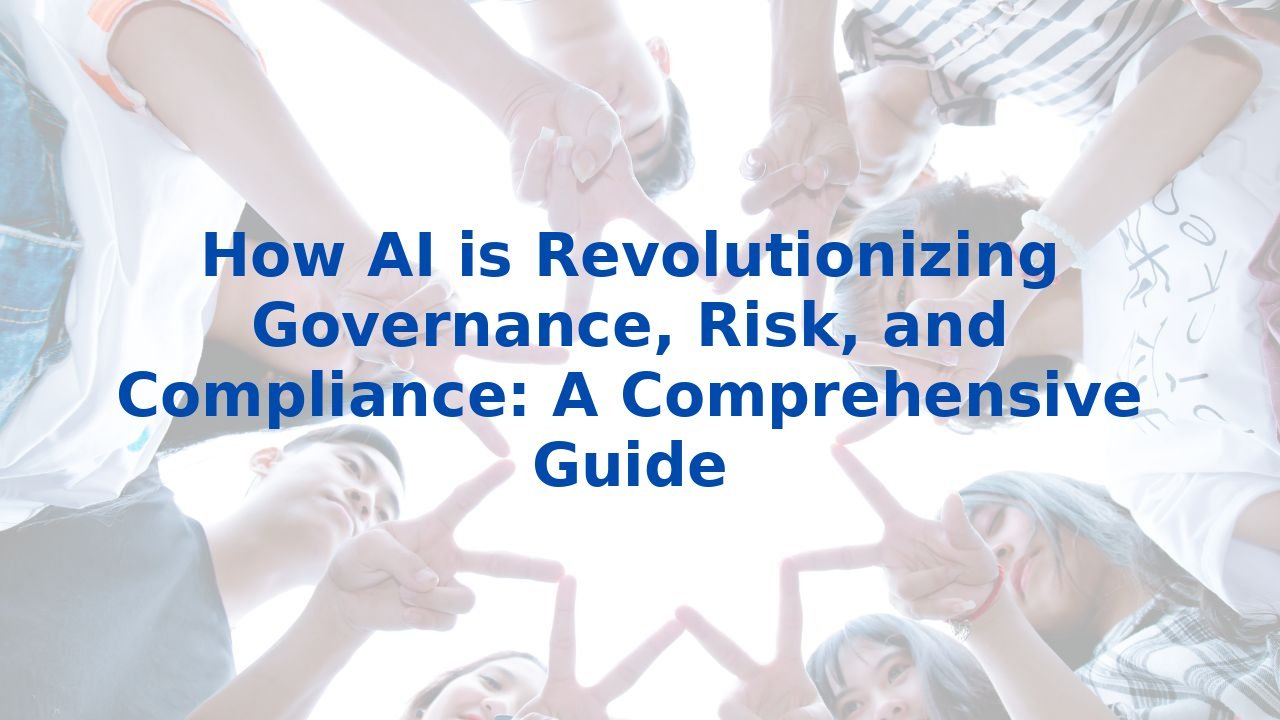How AI is Revolutionizing Governance, Risk, and Compliance: A Comprehensive Guide
How AI is Revolutionizing Governance, Risk, and Compliance: A Comprehensive Guide
The Transformative Role of AI in Governance, Risk, and Compliance (GRC)
In today’s ever-evolving business landscape, Governance, Risk, and Compliance (GRC) stand as the pillars that ensure organizations not only survive but thrive. They are essential in navigating the complexities of legal and regulatory frameworks while fostering accountability and ethical practices. As we delve into the era of Artificial Intelligence (AI), we find that its impact on GRC is profoundly transformative, enhancing the way we approach these critical functions.
The Strategic Importance of GRC
Organizations must align their operations with overarching strategies while managing risks and adhering to regulations. Effective GRC practices play a significant role in building a positive reputation and warding off potential legal pitfalls. They create a culture of accountability where ethical conduct is ingrained within the organizational fabric.
How AI is Reshaping GRC
The integration of AI into GRC processes is not merely a trend; it represents a critical evolution in how we manage these functions. AI breathes new life into GRC by:
- Automated Compliance Monitoring: Imagine an AI system tirelessly monitoring regulatory changes and guiding your compliance efforts by analyzing vast data sets in real-time. This level of vigilance allows organizations to remain compliant without the constant manual oversight.
- Risk Assessment: AI algorithms can sift through complex data amalgamations to identify emerging risks. By providing early warnings, businesses can take proactive measures to mitigate potential threats.
- Enhanced Data Analysis: With the ability to process large volumes of data quickly and accurately, AI arms organizations with insights that drive informed decision-making, influencing strategy and direction.
- Predictive Analytics: By anticipating potential compliance challenges and risks, AI models empower organizations to act before issues arise. This forward-thinking capability is invaluable in today’s fast-paced environment.
Key Challenges in Integrating AI
However, as we embrace the promise of AI, it’s essential to acknowledge the hurdles that accompany its integration into GRC practices. Notably:
- Data Quality: The efficacy of AI models is directly tied to the quality of data utilized for training. Poor-quality data can lead to skewed results and heightened risks.
- Ethical Considerations: Transparency and ethical engagement in AI deployment are paramount. Organizations must navigate issues such as algorithmic bias and data privacy to maintain trust and integrity.
- Employee Training: The successful application of AI tools hinges on employee knowledge. Adequate training is crucial for unlocking AI's potential within GRC.
The Importance of Employee Training
In the quest to capitalize on AI's benefits in GRC, training is non-negotiable. Here’s why:
- Tailored Learning: Customized AI training programs can equip employees with the insights they need to utilize these tools effectively, paving the way for enhanced performance.
- Maximizing Value: When employees are well-versed in AI applications relevant to their roles, organizations can seamlessly integrate AI into existing GRC frameworks, ultimately boosting efficiency.
- Addressing Gaps: Proactive training initiatives can identify and bridge knowledge gaps, ensuring that teams have the expertise required to maneuver the complexities of AI-driven GRC.
Benefits of AI for Improving Efficiency
The integration of AI within GRC processes heralds a new era of operational efficiency. AI promises substantial enhancements through:
- Automation: By automating routine tasks, AI liberates human resources, allowing teams to focus on strategic initiatives that drive growth.
- Speed and Accuracy: The unmatched speed and precision of AI in processing data greatly reduce decision-making timelines, creating a more agile organization.
- Scalability: As organizations scale, AI's ability to manage vast datasets becomes indispensable, making it adaptable to various business sizes.
Conclusion
The marriage of AI and GRC signifies a pivotal shift in how organizations conduct themselves within the regulatory landscape. Understanding the strategic significance of GRC, alongside the challenges of integrating AI, equips businesses to harness AI’s transformative potential fully. Coupled with comprehensive employee training, organizations can not only achieve compliance but foster a culture of innovation and accountability—a dual advantage in paving the way for future growth.
If you’re interested in equipping your organization with the skills necessary for AI integration, consider exploring tailored training programs that foster a knowledgeable workforce. The future is here, and it’s time to embrace it!



